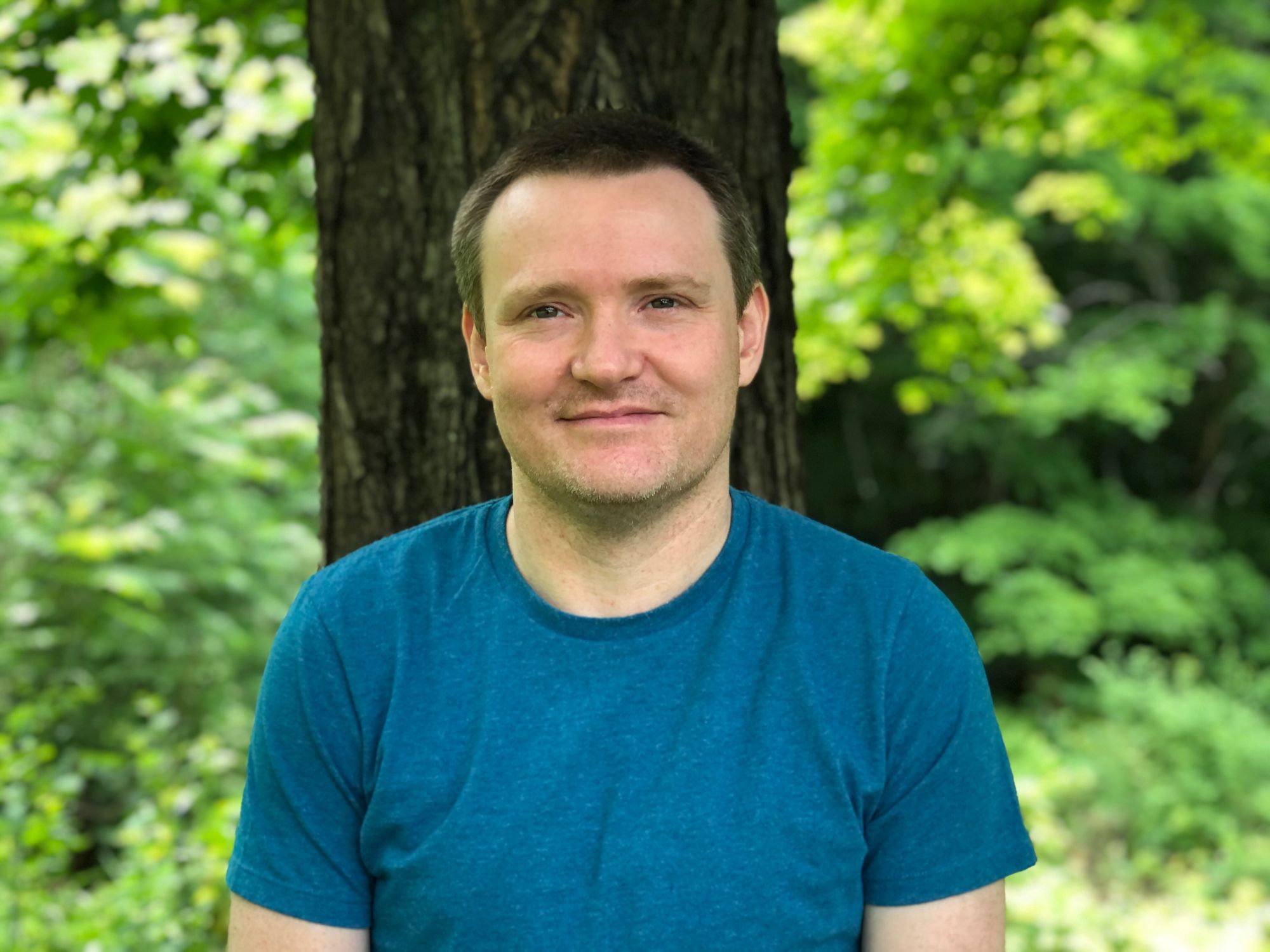Meet Thetford poet Corey D. Cook

Thetford is filled with interesting people, but it's not always easy to meet or get to know your neighbors when you live in a small town. Occassionally, we'd like to introduce you to a Thetfordite by featuring them in a resident profile.
Corey D. Cook is a poet who has lived in Thetford for the past ten years with his wife, Rachael, and their three children. He grew up nearby in South Strafford and attended Thetford Academy. Since 2004 he has published over 270 poems and five chapbooks (small collections of poems). His sixth chapbook, Junk Drawer, is forthcoming from Finishing Line Press in February of 2022.
When did you start writing poetry? What drew you to it?
I started writing poetry in college. Probably 2001 or 2002. I was too intimidated by poetry before that. I had convinced myself it was too lofty for me and that I was not one of the chosen few. Thankfully, I had a professor in college (Maura MacNeil) who gave me packets and packets of contemporary poems to read and I came to realize that my assumptions were wrong. There was nothing pretentious about those poems. They were honest, beautifully rendered, and really invited readers in. She introduced me to poets that semester who remain my all-time favorites.
So, if I am being completely honest, I can’t say that I was drawn to it at first. I needed some coaxing. After that I quickly learned to love it for a number of different reasons. The ones that come immediately to mind are: the challenge of trying to do so much with so little, playing and experimenting with sound and, most importantly, for me is that feeling of intimacy that is created between poet and reader. Poets are often open and vulnerable in their writing, which makes the reader feel like a close and trusted friend. This can result in profound emotional connections that seem unique to poetry.
Are there any other poets or writers in your immediate family?
I know that my paternal grandmother, Virginia Stanley Cook, wrote poems. One of them is framed and on display in our home. It was her wedding gift to us. She also had a manuscript of a children’s book that she shared with us several years before she passed away.
What was the first poem you ever published? Did you experience
much rejection?
“A Note to Donald Hall” was the first poem I published. It appeared in the 2004 issue of Northern New England Review. I remember reading and rereading the acceptance letter in my car outside the Henniker, NH, post office. I had to convince myself that it was actually happening. That I wasn’t dreaming. It was one of the most exciting and emotional days of my life.
If my memory is correct, it was two solid years of nothing but rejection letters before that.
What inspires your poetry? Are your poems based on your own
experiences?
My poems are often inspired by something that is happening in my life or something I witness/hear about. Nature is certainly an inspiration as well and, sometimes, the poems just seem to present themselves. I can’t articulate how that happens, but I am so grateful that it does. Ruth Stone spoke about this phenomenon in several interviews that I have watched. She said that she could feel the poem approaching and would run for her paper and pen. If she took too long, the poem would pass her by.
Who has been most influential in your journey as a poet?
I am convinced that the only reason that I am writing poetry today is because I was lucky enough to have teachers and professors who convinced me that I could be a writer. I think the most credit probably goes to Patricia Carsten. She was a Special Education teacher at Newton Elementary School that I started working with in first grade because I was really struggling with reading and writing. She recognized that I had stories to tell and asked me to start writing and illustrating books. That was the spark. That spark was then fanned by Joey Hawkins in middle school, Peggy Sadler in high school, and Kevin Harvey, Maura MacNeil, and Martha Andrews Donovan in college.
What's your process for writing a poem? How many drafts do your
poems go through?
My writing process has evolved over time. For example, writing before our children arrived looked very different than it does now. My current process is to carry around an idea in my head and wait for it to develop. If it doesn’t, it will eventually fade away and, hopefully, be replaced by another one. If it does develop, I type it out on the computer and the revising starts.
The number of drafts depends on the poem. Most of my poems probably go through 10 to 20 drafts.
How do you deal with writer's block?
I have been trying to think of writer’s block as a cue to pivot away from writing. It means that it is time to reengage with the outside world, turn to the work of other writers and artists, attend readings, watch interviews of writers or artists that I admire, etc.
Do you have any advice for aspiring poets or writers?
Do lots and lots of reading. There is much to learn from reading and studying the works of others. Then do lots and lots of writing. Find writers that are kindred spirits and reach out to them. They may be willing to be a mentor or, at least, answer some of your questions. Become part of a writing community. Set goals for yourself. This is something I still do. My very first goal was to publish a poem and, as you now know, it took two years for that to happen. But it did happen!
Favorite Vermont poets(s): Ina Anderson, David Budbill, James Crews, Laura Foley, Grace Paley, Anne Shafmaster, Ruth Stone, Ellen Bryant Voigt, Mame Willey, and others.
Favorite female poet(s): Jane Kenyon, but I also really love Cindy Kelly Benabderrahman, Cynthia Brackett-Vincent, Martha Christina, Martha Andrews Donovan, Megan Falley, Amy L. George, Carolynn Kingyens, Maxine Kumin, Joan Larkin, Maura MacNeil, Wilma Elizabeth McDaniel, Sheryl L. Nelms, Sharon Olds, Mary Oliver, Alice N. Persons, Shoshauna Shy, Jane Vincent Taylor, Alarie Tennille, and others.
Favorite dead poet(s): It’s a tie between Donald Hall and Jane Kenyon.
Below are two of Corey's poems. "Long Sands Beach (York, Maine)" was first published in Freshwater Literary Journal as well as featured in the chapbook The Weight of Shadows. "You Drive Me to the Hospital the Day of My Surgery" was first published in Nixes Mate Review. His other chapbooks include Rhododendron in a Time of War, What to Do with a Dying Parakeet, Flock, and White Flag Raised. Contact Corey D. Cook directly for copies of any of his chapbooks.
Long Sands Beach (York, Maine)
We sit on the cement stairs
and watch a seagull poke
a rumpled paper bag
with its beak
as the tide comes in
You tell me your mother
was prone to fits of rage
Destroyed so many things
Not a single heirloom spared
Depression glass
Hand-woven baskets
Stoneware jugs
I ask if she was ever physical
with you and you turn away
Stare at the relentless waves
Waves that reach out
for the broken
For the discarded
Shards of glass
Splintered sticks
Crushed stones
Waves that will soften
their sharp edges
Their pointy tips
Transform them into
things to hold on to
Things to cherish
You Drive Me to the Hospital the Day of My Surgery
A gloved hand reaches
for the center console,
frets over air vents,
the radio’s temperamental dial,
the other remains on the wheel,
keeps us between the painted lines,
as the car turns left,
follows the dark vein of the river,
as trees gather,
lean in,
as crows work on the carcass of a deer,
their movements systematic,
beaks scalpel-sharp,
as the train track’s tidy stitches
receive a fresh dressing of snow.
